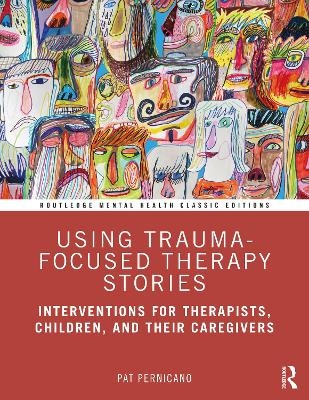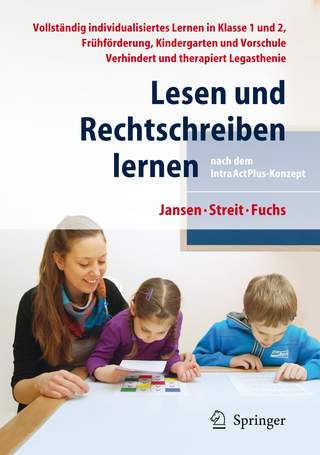
Using Trauma-Focused Therapy Stories
Routledge (Verlag)
978-1-032-01896-6 (ISBN)
Using Trauma-Focused Therapy Stories is a groundbreaking treatment resource for trauma-informed therapists who work with abused and neglected children ages nine years and older as well as their caregivers. The classic edition includes a new preface from the author reflecting on changes in the field since the book’s initial publication.
The therapy stories are perfect accompaniments to evidence-based treatment approaches and provide the foundation for psychoeducation and intervention with the older elementary-aged child or early pre-teen. Therapists will also benefit from the inclusion of thorough guides for children and caregivers, which illustrate trauma and developmental concepts in easy-to-understand terms. The psychoeducational material in the guides, written at a third- to fourth-grade reading level, may be used within any trauma-informed therapy model in the therapy office or sent-home for follow-up. Each therapy story illustrates trauma concepts, guides trauma narrative and cognitive restructuring work, and illuminates caregiver blind spots; the caregiver stories target issues that often become barriers to family trauma recovery. No therapist who works with young trauma survivors will want to be without this book, and school-based professionals, social workers, psychologists and others committed to working with traumatized children will find the book chock-full of game-changing ideas for their practice.
Pat Pernicano, PsyD, is a psychologist with South Texas Veterans Health Care System in San Antonio, where she specializes in the treatment of trauma and moral injury. She previously provided clinical and supervisory services at not-for-profit mental health agencies. Dr. Pernicano served as an associate adjunct professor and clinical faculty member in the Spalding University PsyD program from 1996 to 2015.
Preface to the Classic Edition Part 1: Therapist Guide for Use of Trauma- Related Therapy Stories 1. Overview: Impact of Trauma on Child Development and Caregiving Behavior 2. Using Narrative, Metaphor, and Trauma-Focused Stories in Trauma Intervention Part 2: Therapy Stories to Use with Children 3. Psychoeducation 4. Relaxation 5. Affect Identifi cation and Expression 6. Cognitive Coping 7. Trauma Narrative Work 8. In Vivo Exposure 9. Conjoint Parent–Child Work and Attachment Issues 10. Ensuring Future Safety and Wellbeing Part 3: Therapy Stories to Use with Adolescents 11. Psychoeducation 12. Affect Identifi cation and Expression 13. Cognitive Coping 14. Trauma Narrative 15. Conjoint Parent–Child Work and Attachment Issues 16. Enhancing Future Safety and Wellbeing Part 4: Therapy Stories to Use with Caregivers 17. Adult Issues and Blind Spots 18. Parenting Issues Part 5: Child’s Guide to Trauma 19. Introduction for the Child Reader 20. The Impact of Abuse 21. Freak Out (Vigilance) 22. Freeze or High Emotion (Alarm) 23. Flight (Escape) 24. Fight (Terror) 25. Abuse and Trauma 26. Post-Traumatic Stress Disorder and Complex Trauma 27. How Stress Affects Kids 28. Memory of Abuse 29. How Adults Can Help (or Hurt) Abused Kids 30. The Trauma Chain Reaction: Freak Out 31. The Trauma Chain Reaction: Freeze 32. The Trauma Chain Reaction: Flight 33. The Trauma Chain Reaction: Fight 34. Your Own Chain Reaction 35. What Does Your Brain Have to Do With It? 36. How Stress Changes Your Brain 37. Coping Skills: Calm Down 38. Coping Skills: Connect 39. Coping Skills: Conquer Part 6: Caregiver’s Guide to Trauma 40. The Impact of Trauma on Development 41. Neurobiology and Trauma 42. Caregiver Stress and Self-Care Appendices
| Erscheinungsdatum | 01.09.2021 |
|---|---|
| Reihe/Serie | Routledge Mental Health Classic Editions |
| Verlagsort | London |
| Sprache | englisch |
| Maße | 210 x 280 mm |
| Gewicht | 644 g |
| Themenwelt | Geisteswissenschaften ► Psychologie ► Pädagogische Psychologie |
| Medizin / Pharmazie ► Medizinische Fachgebiete ► Notfallmedizin | |
| Medizin / Pharmazie ► Medizinische Fachgebiete ► Psychiatrie / Psychotherapie | |
| Sozialwissenschaften ► Pädagogik ► Didaktik | |
| Sozialwissenschaften ► Pädagogik ► Sozialpädagogik | |
| Sozialwissenschaften ► Soziologie | |
| ISBN-10 | 1-032-01896-8 / 1032018968 |
| ISBN-13 | 978-1-032-01896-6 / 9781032018966 |
| Zustand | Neuware |
| Informationen gemäß Produktsicherheitsverordnung (GPSR) | |
| Haben Sie eine Frage zum Produkt? |
aus dem Bereich


